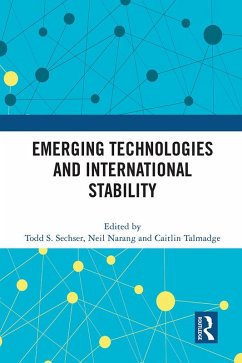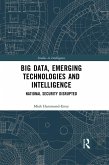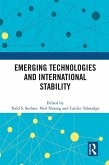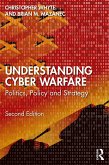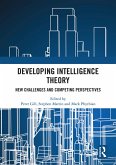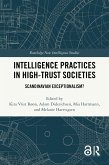Emerging Technologies and International Stability (eBook, ePUB)
Redaktion: Sechser, Todd S.; Talmadge, Caitlin; Narang, Neil
43,95 €
43,95 €
inkl. MwSt.
Sofort per Download lieferbar

22 °P sammeln
43,95 €
Als Download kaufen

43,95 €
inkl. MwSt.
Sofort per Download lieferbar

22 °P sammeln
Jetzt verschenken
Alle Infos zum eBook verschenken
43,95 €
inkl. MwSt.
Sofort per Download lieferbar
Alle Infos zum eBook verschenken

22 °P sammeln
Emerging Technologies and International Stability (eBook, ePUB)
Redaktion: Sechser, Todd S.; Talmadge, Caitlin; Narang, Neil
- Format: ePub
- Merkliste
- Auf die Merkliste
- Bewerten Bewerten
- Teilen
- Produkt teilen
- Produkterinnerung
- Produkterinnerung

Bitte loggen Sie sich zunächst in Ihr Kundenkonto ein oder registrieren Sie sich bei
bücher.de, um das eBook-Abo tolino select nutzen zu können.
Hier können Sie sich einloggen
Hier können Sie sich einloggen
Sie sind bereits eingeloggt. Klicken Sie auf 2. tolino select Abo, um fortzufahren.

Bitte loggen Sie sich zunächst in Ihr Kundenkonto ein oder registrieren Sie sich bei bücher.de, um das eBook-Abo tolino select nutzen zu können.
Emerging technologies have inspired much speculative commentary, but academic scholarship can improve the discussion with disciplined theory-building and rigorous empirics. This book aims to contribute to the debate by exploring the role of technology in shaping international security.
- Geräte: eReader
- mit Kopierschutz
- eBook Hilfe
Andere Kunden interessierten sich auch für
![Big Data, Emerging Technologies and Intelligence (eBook, ePUB) Big Data, Emerging Technologies and Intelligence (eBook, ePUB)]() Miah Hammond-ErreyBig Data, Emerging Technologies and Intelligence (eBook, ePUB)42,95 €
Miah Hammond-ErreyBig Data, Emerging Technologies and Intelligence (eBook, ePUB)42,95 €![Emerging Technologies and International Stability (eBook, PDF) Emerging Technologies and International Stability (eBook, PDF)]() Emerging Technologies and International Stability (eBook, PDF)43,95 €
Emerging Technologies and International Stability (eBook, PDF)43,95 €![Understanding Cyber-Warfare (eBook, ePUB) Understanding Cyber-Warfare (eBook, ePUB)]() Christopher WhyteUnderstanding Cyber-Warfare (eBook, ePUB)38,95 €
Christopher WhyteUnderstanding Cyber-Warfare (eBook, ePUB)38,95 €![The Authorised History of British Defence Economic Intelligence (eBook, ePUB) The Authorised History of British Defence Economic Intelligence (eBook, ePUB)]() Peter DaviesThe Authorised History of British Defence Economic Intelligence (eBook, ePUB)45,95 €
Peter DaviesThe Authorised History of British Defence Economic Intelligence (eBook, ePUB)45,95 €![Developing Intelligence Theory (eBook, ePUB) Developing Intelligence Theory (eBook, ePUB)]() Developing Intelligence Theory (eBook, ePUB)41,95 €
Developing Intelligence Theory (eBook, ePUB)41,95 €![Cognitive Warfare (eBook, ePUB) Cognitive Warfare (eBook, ePUB)]() Adam HenschkeCognitive Warfare (eBook, ePUB)42,95 €
Adam HenschkeCognitive Warfare (eBook, ePUB)42,95 €![Intelligence Practices in High-Trust Societies (eBook, ePUB) Intelligence Practices in High-Trust Societies (eBook, ePUB)]() Intelligence Practices in High-Trust Societies (eBook, ePUB)42,95 €
Intelligence Practices in High-Trust Societies (eBook, ePUB)42,95 €-
-
-
Emerging technologies have inspired much speculative commentary, but academic scholarship can improve the discussion with disciplined theory-building and rigorous empirics. This book aims to contribute to the debate by exploring the role of technology in shaping international security.
Dieser Download kann aus rechtlichen Gründen nur mit Rechnungsadresse in A, B, BG, CY, CZ, D, DK, EW, E, FIN, F, GR, HR, H, IRL, I, LT, L, LR, M, NL, PL, P, R, S, SLO, SK ausgeliefert werden.
Produktdetails
- Produktdetails
- Verlag: Taylor & Francis eBooks
- Seitenzahl: 308
- Erscheinungstermin: 28. November 2021
- Englisch
- ISBN-13: 9781000485561
- Artikelnr.: 62623845
- Verlag: Taylor & Francis eBooks
- Seitenzahl: 308
- Erscheinungstermin: 28. November 2021
- Englisch
- ISBN-13: 9781000485561
- Artikelnr.: 62623845
- Herstellerkennzeichnung Die Herstellerinformationen sind derzeit nicht verfügbar.
Todd S. Sechser is the Pamela Feinour Edmonds and Franklin S. Edmonds Jr. Discovery Professor of Politics and Public Policy at the University of Virginia, USA, Senior Fellow at the Miller Center of Public Affairs, and Director of the University of Virginia's Democratic Statecraft Lab. Dr. Sechser's research interests include coercive diplomacy, nuclear security, emerging technologies, and the psychological effects of political violence. Neil Narang is Associate Professor in the Department of Political Science at the University of California, Santa Barbara, USA, Research Director at the Institute for Global Conflict and Cooperation (IGCC), and Jeane Kirkpatrick Visiting Scholar at the American Enterprise Institute. He is currently an advisor to the Director's Office of Los Alamos National Laboratory, a faculty affiliate at the Stanford University Center for International Security, and Term Member of the Council on Foreign Relations. He previously served as Senior Advisor in the U.S. Department of Defense. Narang specializes in international relations, with a focus on issues of international security and conflict management. Caitlin Talmadge is Associate Professor of Security Studies at Georgetown University, USA, where her research and teaching focus on nuclear deterrence, military effectiveness, civil-military relations, and security issues in Asia and the Persian Gulf. She is a Non-Resident Senior Fellow at the Brookings Institution and previously worked as a consultant to the U.S. Department of Defense.
PART I: INTRODUCTION Emerging technologies and international stability
PART II: COMPETITION AND COERCION IN THE TECHNOLOGICAL AGE 1. The
capability/vulnerability paradox and military revolutions: Implications for
computing, cyber, and the onset of war 2. Cheap fights, credible threats:
The future of armed drones and coercion 3. Extended deterrence and
assurance in an emerging technology environment PART III: CRISIS, CONFLICT,
AND WAR 4. Blood and robots: How remotely piloted vehicles and related
technologies affect the politics of violence 5. When speed kills: Lethal
autonomous weapon systems, deterrence and stability 6. Emerging technology
and intra-war escalation risks: Evidence from the Cold War, implications
for today PART IV: OFFENSE, DEFENSE, AND STABILITY 7. Asymmetric arms
control and strategic stability: Scenarios for limiting hypersonic glide
vehicles 8. Dual-use distinguishability: How 3D-printing shapes the
security dilemma for nuclear programs 9. How does the offense-defense
balance scale? PART V: LESSONS LEARNED AND FUTURE DIRECTIONS 10. Conclusion
PART II: COMPETITION AND COERCION IN THE TECHNOLOGICAL AGE 1. The
capability/vulnerability paradox and military revolutions: Implications for
computing, cyber, and the onset of war 2. Cheap fights, credible threats:
The future of armed drones and coercion 3. Extended deterrence and
assurance in an emerging technology environment PART III: CRISIS, CONFLICT,
AND WAR 4. Blood and robots: How remotely piloted vehicles and related
technologies affect the politics of violence 5. When speed kills: Lethal
autonomous weapon systems, deterrence and stability 6. Emerging technology
and intra-war escalation risks: Evidence from the Cold War, implications
for today PART IV: OFFENSE, DEFENSE, AND STABILITY 7. Asymmetric arms
control and strategic stability: Scenarios for limiting hypersonic glide
vehicles 8. Dual-use distinguishability: How 3D-printing shapes the
security dilemma for nuclear programs 9. How does the offense-defense
balance scale? PART V: LESSONS LEARNED AND FUTURE DIRECTIONS 10. Conclusion
PART I: INTRODUCTION Emerging technologies and international stability
PART II: COMPETITION AND COERCION IN THE TECHNOLOGICAL AGE 1. The
capability/vulnerability paradox and military revolutions: Implications for
computing, cyber, and the onset of war 2. Cheap fights, credible threats:
The future of armed drones and coercion 3. Extended deterrence and
assurance in an emerging technology environment PART III: CRISIS, CONFLICT,
AND WAR 4. Blood and robots: How remotely piloted vehicles and related
technologies affect the politics of violence 5. When speed kills: Lethal
autonomous weapon systems, deterrence and stability 6. Emerging technology
and intra-war escalation risks: Evidence from the Cold War, implications
for today PART IV: OFFENSE, DEFENSE, AND STABILITY 7. Asymmetric arms
control and strategic stability: Scenarios for limiting hypersonic glide
vehicles 8. Dual-use distinguishability: How 3D-printing shapes the
security dilemma for nuclear programs 9. How does the offense-defense
balance scale? PART V: LESSONS LEARNED AND FUTURE DIRECTIONS 10. Conclusion
PART II: COMPETITION AND COERCION IN THE TECHNOLOGICAL AGE 1. The
capability/vulnerability paradox and military revolutions: Implications for
computing, cyber, and the onset of war 2. Cheap fights, credible threats:
The future of armed drones and coercion 3. Extended deterrence and
assurance in an emerging technology environment PART III: CRISIS, CONFLICT,
AND WAR 4. Blood and robots: How remotely piloted vehicles and related
technologies affect the politics of violence 5. When speed kills: Lethal
autonomous weapon systems, deterrence and stability 6. Emerging technology
and intra-war escalation risks: Evidence from the Cold War, implications
for today PART IV: OFFENSE, DEFENSE, AND STABILITY 7. Asymmetric arms
control and strategic stability: Scenarios for limiting hypersonic glide
vehicles 8. Dual-use distinguishability: How 3D-printing shapes the
security dilemma for nuclear programs 9. How does the offense-defense
balance scale? PART V: LESSONS LEARNED AND FUTURE DIRECTIONS 10. Conclusion
